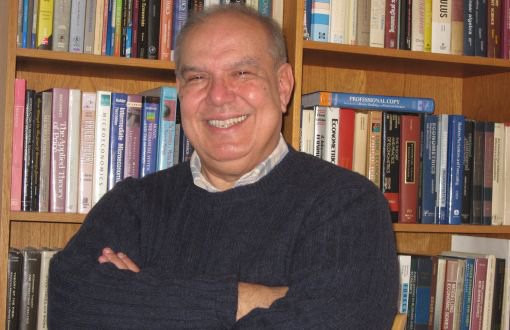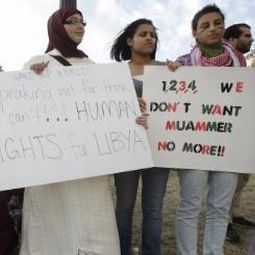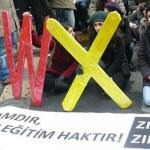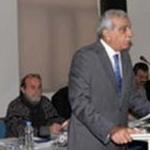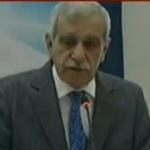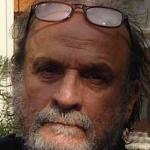"For a World without War"
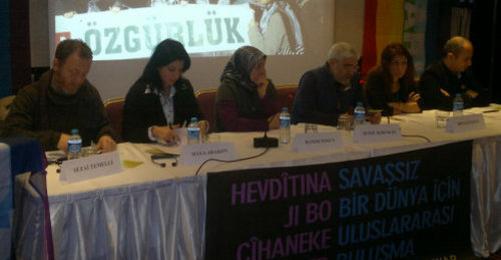
The Commission on Global Peace and Justice (Küresel BAK) organized the "International Meeting for a World without War" in Istanbul on 26 February 2011. The focus of attention was laid on the importance and actuality of the Kurdish question, steps to take towards peace, the social, economic and humanitarian cost of war and ensuring peace between different groups of society.
"Solidarity for the people who stand up for freedom"
Ufuk Uras, Member of Parliament for the pro-Kurdish Peace and Democracy Party (BDP), emphasized the importance of this meeting just before the declared expiry of the ceasefire on 1 March.
He demanded solidarity for the people who stand up for dignity, freedom and equality. Uras said that everybody very much appreciated the recent uprisings against dictators in the Middle East and that finally the requests for democracy and freedom from bottom to top started to gain impetus.
"War economics rule at war"
According to Assistant Prof. Maya Arakon from the Yeditepe University, there was nothing new to say related to the Kurdish question. Yet, more people should be enabled to understand the things said until today, she started her speech.
Arakon said that 50,000 people died in the so-called "low-intensity war" started by the Turkish Armed Forces (TSK) in 1984 when the militant Kurdistan Workers' Party (PKK) started its fight against the oppression of the Kurdish people. 17,500 people became victims of unsolved murder cases, 2 million people were forced to migrate, the academic continued. She argued that the number of people who were physically and psychologically injured in this war was not clear.
The war took its toll
Military expenditures in the name of the struggle against the PKK made up for 2 percent of the GDP in 1988. Arakon pointed out that this share increased to 5 percent in 1999 and stated that $ 100 billion were spend on this "dirty war" between 1988 and 2004. Hence, only the TSK is spending TL 7.5 billion on the "low-intensity war" per year, she concluded.
The Police Directorate is spending about just as much for this struggle. According to official numbers, the police allocated $ 120 billion dollar of their budget between 1980 and 2000. This makes a total expenditure of TL 15 billion per year for the police and anti-terror units.
"Both Kurds and Turks paid a high price"
Arakon drew special attention to economically disadvantaged Kurdish and Turkish children who are the victims of this war because they were made the tools of the warlords.
"We have not seen and we will not see rich children in this war; the poor ones are being made fighting. That is why nobody really cares", Arakon criticized.
"Language is a person's identity"
Ronayi Önen, Kurdish Language Lecturer at the Bilgi University, put forward that removing the obstacles before the use of the mother language was one of the most important factors to solve the Kurdish question. In his speech delivered in Kurdish, Önen mentioned the impact of education in the mother language.
He stressed the scientific fact that the public memory and social codes were embedded in the mother language. In this aspect, education in the mother language would increase the confidence of Kurdish students in big cities in particular. They would be enabled to coalesce with society instead of becoming estranged, Önen indicated.
"'Disappearing' is something one cannot comprehend"
Hanım Tosun spoke on behalf of the Saturday Mothers/People, an association of relatives of disappeared people. She said that they were not going to give up their struggle despite all sorts of police intervention, torture and police custody subsequent to the disappearance of their relatives. Tosun explained what happened around the time her husband Fehmi Tosun disappeared and continued:
"My husband might have been a member of an illegal organization. If the legal punishment for this was execution they should have executed him. But "disappearing" is something one cannot comprehend. Every time they find a new mass grave and start digging with their shovels I cannot sleep. When I die one day, please bury me in a grave for the homeless. My relatives and my husband are there too". (EKN/EÖ/VK)
Journalist Ahmet Nesin to Apply for Renunciation of Citizenship

Conscientious Objector Işık Acquitted of ‘Alienating People from Military Service’
.jpg)
The Ones Massacred in Madımak 26 Years Ago Commemorated in Sivas

2019 LOCAL ELECTIONS
HDP MP Paylan: Not a Single Objection by HDP is Accepted Throughout Turkey

Q&A WITH PROF. AKARCA ON MARCH 31 ELECTIONS
'Contrary to Past Elections, Government Spreads Fear While Opposition Gives Hope'
